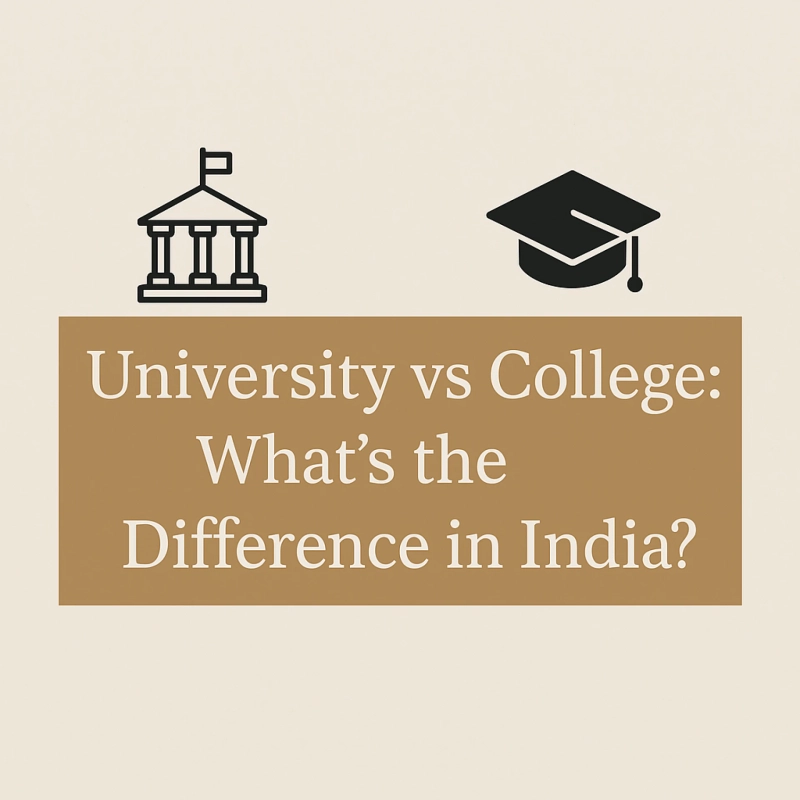In India, terms like college and university are often used interchangeably in casual conversations. However, there are significant differences between the two in terms of structure, autonomy, degrees awarded, and administrative authority. For students navigating the Indian higher education system, understanding these distinctions is essential for making informed decisions about where and what to study.
This article breaks down the nuanced differences between universities and colleges in India, explaining their structure, purpose, and how they impact your academic and career path.
What is a University in India?
A university in India is an institution established either by a central or state government, or through an act of Parliament or State Legislature. Universities are authorized by the University Grants Commission (UGC) to award degrees in various disciplines. They have the right to design curriculum, conduct examinations, and issue recognized degrees under the UGC Act, 1956.
Types of Universities in India
India has several types of universities, categorized by their funding and governing body:
1. Central Universities
- Established by an Act of Parliament.
- Funded and governed by the Central Government (MHRD).
- Examples: University of Delhi, Jawaharlal Nehru University (JNU), Banaras Hindu University (BHU).
2. State Universities
- Established by State Legislative Assemblies.
- Funded by respective state governments.
- Examples: University of Mumbai, University of Madras, Panjab University.
3. Deemed-to-be Universities
- Recognized for their academic excellence in a specific field.
- Granted university status by the UGC under Section 3 of the UGC Act.
- Examples: Tata Institute of Social Sciences (TISS), Birla Institute of Technology and Science (BITS).
4. Private Universities
- Established by private entities through State Acts.
- Must be approved by the UGC.
- Examples: Amity University, Shiv Nadar University, Ashoka University.
Functions of a University
- Curriculum Design: Universities have academic autonomy to design syllabi.
- Affiliation Authority: They grant affiliation to colleges (especially in state systems).
- Examination & Degree Granting: Universities conduct exams and award degrees.
- Research & Development: They focus heavily on research, PhD programs, and innovation.
- Accreditation Management: Most accredited by bodies like NAAC or NBA for quality assurance.
What is a College in India?
A college is an educational institution that offers undergraduate and/or postgraduate courses but cannot award degrees in its own name. Instead, it functions under the academic control and affiliation of a university. The degrees earned at a college are officially granted by the university with which it is affiliated.
Types of Colleges in India
1. Government Colleges
- Run and funded by the government (central or state).
- Low tuition fees.
- Example: Government College of Engineering, Pune.
2. Private Colleges
- Run by private trusts or educational societies.
- Affiliated with a university, but privately managed and self-financed.
- Example: Ramjas College (affiliated to University of Delhi).
3. Autonomous Colleges
- Have academic independence to frame their own syllabi and conduct exams.
- Still affiliated to a university for degree conferral.
- Example: Loyola College, Chennai.
4. Constituent Colleges
- Fully governed and managed by the university.
- Example: Hindu College (University of Delhi), St. Xavier’s College (University of Mumbai).
Functions of a College
- Teaching & Instruction: Primary role is to provide classroom instruction.
- Curriculum Implementation: Follows syllabus and guidelines provided by its parent university.
- Internal Assessment: Conducts internal evaluations and practicals.
- University Exams: Prepares students for end-semester exams conducted by the university.
- Skill Development: May offer soft skills and placement training based on institutional resources.
Key Differences Between University and College in India
1. Legal Status
- University: Established through central or state legislative acts, or recognized by the University Grants Commission (UGC).
- College: Generally affiliated to a university and does not operate independently.
2. Degree Granting Authority
- University: Can confer degrees in its own name.
- College: Cannot award degrees independently; degrees are issued by the affiliating university.
3. Academic Autonomy
- University: Has full autonomy to design curriculum, introduce new courses, and conduct examinations.
- College: Operates under the academic framework and examination system of the affiliated university.
4. Research Capability
- University: Encouraged and structured to conduct research activities, offer MPhil/PhD programs, and manage funded research projects.
- College: Typically limited to undergraduate and postgraduate teaching, with minimal research infrastructure.
5. Number of Courses Offered
- University: Offers a broad range of courses across faculties like Arts, Science, Commerce, Engineering, Law, Medicine, etc.
- College: Offers a limited number of courses, depending on university approval and institutional capacity.
6. Governance Structure
- University: Managed by statutory bodies like Chancellor, Vice-Chancellor, Senate, Academic Council, etc.
- College: Managed by a Principal and the College Management Committee, with limited autonomy.
7. Affiliation Role
- University: Has the authority to affiliate multiple colleges under its academic umbrella.
- College: Cannot affiliate other institutions; it itself remains under a university's affiliation.
8. Examples
- University: University of Delhi, Anna University, Jawaharlal Nehru University (JNU), IGNOU.
- College: Hindu College (under DU), Loyola College (under University of Madras), Fergusson College (under SPPU).
Autonomous Colleges vs Universities: A Gray Area
Some confusion arises with autonomous colleges. These are institutions that are given academic independence by the UGC but are still affiliated to a university for awarding degrees. They can:
- Design their own syllabus.
- Conduct internal exams.
- Have independent administration.
However, the degree is still awarded in the name of the parent university. Thus, while they enjoy more freedom than regular colleges, they are not full-fledged universities.
Why Does the Distinction Matter?
1. Academic Scope
- Universities offer broader academic and research opportunities including doctoral programs.
- Colleges are more focused on classroom teaching and specific programs.
2. Recognition & Prestige
- Degrees from reputed universities (especially central and state universities) carry a significant academic weight.
- Well-ranked autonomous and constituent colleges can also offer excellent education, but the degree comes from the parent university.
3. Admission Process
- Universities may have centralized admission systems (e.g., CUET for central universities).
- Colleges follow the admission norms set by their affiliating universities.
4. Fees Structure
- Public universities and government colleges tend to be more affordable.
- Private universities and self-financed colleges can be relatively expensive.
5. Career Prospects
- Graduating from a prestigious university may improve your employability.
- However, top-ranked colleges can also have excellent placement cells and industry tie-ups.
It’s important to cross-verify details such as recognition, accreditation, and university affiliations through reliable sources of academic data before applying.
Examples to Understand Better
Let’s consider a student wanting to pursue B.Com:
- If they apply to University of Delhi (DU), they may get admission in Shri Ram College of Commerce (SRCC), a constituent college of DU.
- The degree will be from DU.
- If they apply to Amity University, a private university, they study directly under the university.
- The degree will be from Amity itself.
- If they join Fergusson College, affiliated to Savitribai Phule Pune University (SPPU),
- The degree will be awarded by SPPU.
Which is Better: College or University?
There is no one-size-fits-all answer. It depends on your academic goals, financial situation, and preferred learning environment.
- If you're interested in research, interdisciplinary studies, or higher degrees (MPhil/PhD) – a university is the better option.
- If you want a focused UG or PG education with good faculty and a smaller campus community – a reputed college might suit you better.
- If you're looking for affordable education with a government subsidy – aim for state or central universities and their affiliated colleges.
- If you're willing to invest in modern infrastructure, industry-linked curriculum, and flexibility – a private university or autonomous college may appeal.
Conclusion
In the Indian education system, the terms university and college refer to fundamentally different entities. Universities are larger, autonomous bodies that control academic policy, award degrees, and sometimes govern numerous affiliated colleges. Colleges, on the other hand, function under the umbrella of a university and are responsible for teaching and internal assessments.
Understanding this distinction is crucial when choosing where to study. A university might offer broader options and research scope, while a reputed college can provide quality instruction and a strong campus community.
Ultimately, the right choice depends on the course you want to pursue, your career goals, and the academic environment in which you thrive.


